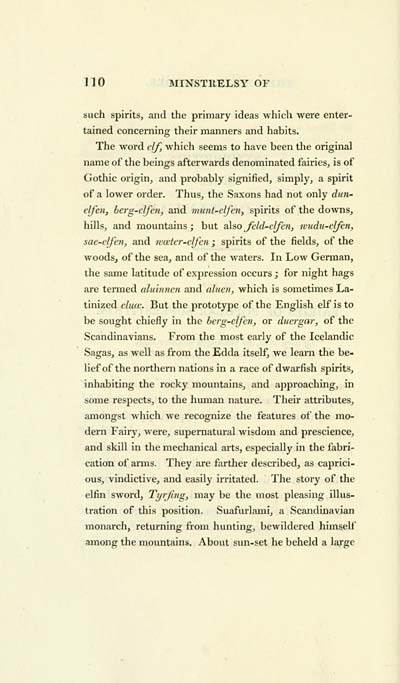Download files
Complete book:
Individual page:
Thumbnail gallery: Grid view | List view

110 MINSTRELSY OF
such spirits, and the primary ideas which were enter-
tained concerning their manners and habits.
The word elf, which seems to have been the original
name of the beings afterwards denominated fairies, is of
Gothic origin, and probably signified, simply, a spirit
of a lower order. Thus, the Saxons had not only dun-
elfeti, berg-clfen, and munt-dfen, spirits of the downs,
hills, and mountains ; but also Jeld-elfcn, wudu-elfen,
xae-elfen, and wceter-elfeu ; spirits of the fields, of the
woods, of the sea, and of the waters. In Low German,
the same latitude of expression occurs ; for night hags
are termed ahdnnen and aluen, which is sometimes La-
tinized eluce. But the prototype of the English elf is to
be sought chiefly in the berg-eljen, or due?-gar, of the
Scandinavians. From the most early of the Icelandic
Sagas, as well as from the Edda itself, we learn the be-
lief of the northern nations in a race of dwarfish spirits,
inhabiting the rocky mountains, and approaching, in
some respects, to the human nature. Their attributes,
amongst which we recognize the features of the mo-
dern Fairy, were, supernatural wisdom and prescience,
and skill in the mechanical arts, especially in the fabri-
cation of arms. They are farther described, as caprici-
ous, vindictive, and easily irritated. The story of the
elfin sword, Tijrjing, may be the most pleasing illus-
tration of this position. Suafurlami, a Scandinavian
monarch, returning from hunting, bewildered himself
among the mountains. About sun-set he beheld a la^ge
such spirits, and the primary ideas which were enter-
tained concerning their manners and habits.
The word elf, which seems to have been the original
name of the beings afterwards denominated fairies, is of
Gothic origin, and probably signified, simply, a spirit
of a lower order. Thus, the Saxons had not only dun-
elfeti, berg-clfen, and munt-dfen, spirits of the downs,
hills, and mountains ; but also Jeld-elfcn, wudu-elfen,
xae-elfen, and wceter-elfeu ; spirits of the fields, of the
woods, of the sea, and of the waters. In Low German,
the same latitude of expression occurs ; for night hags
are termed ahdnnen and aluen, which is sometimes La-
tinized eluce. But the prototype of the English elf is to
be sought chiefly in the berg-eljen, or due?-gar, of the
Scandinavians. From the most early of the Icelandic
Sagas, as well as from the Edda itself, we learn the be-
lief of the northern nations in a race of dwarfish spirits,
inhabiting the rocky mountains, and approaching, in
some respects, to the human nature. Their attributes,
amongst which we recognize the features of the mo-
dern Fairy, were, supernatural wisdom and prescience,
and skill in the mechanical arts, especially in the fabri-
cation of arms. They are farther described, as caprici-
ous, vindictive, and easily irritated. The story of the
elfin sword, Tijrjing, may be the most pleasing illus-
tration of this position. Suafurlami, a Scandinavian
monarch, returning from hunting, bewildered himself
among the mountains. About sun-set he beheld a la^ge
Set display mode to: Large image | Transcription
Images and transcriptions on this page, including medium image downloads, may be used under the Creative Commons Attribution 4.0 International Licence unless otherwise stated. ![]()
| Early Gaelic Book Collections > J. F. Campbell Collection > Minstrelsy of the Scottish border > Volume 2 > (122) |
|---|
| Permanent URL | https://digital.nls.uk/80616155 |
|---|
| Description | Vol. II . |
|---|---|
| Shelfmark | Cam.2.d.18 |
| Attribution and copyright: |
|
| Description | Volumes from a collection of 610 books rich in Highland folklore, Ossianic literature and other Celtic subjects. Many of the books annotated by John Francis Campbell of Islay, who assembled the collection. |
|---|
| Description | Selected items from five 'Special and Named Printed Collections'. Includes books in Gaelic and other Celtic languages, works about the Gaels, their languages, literature, culture and history. |
|---|

